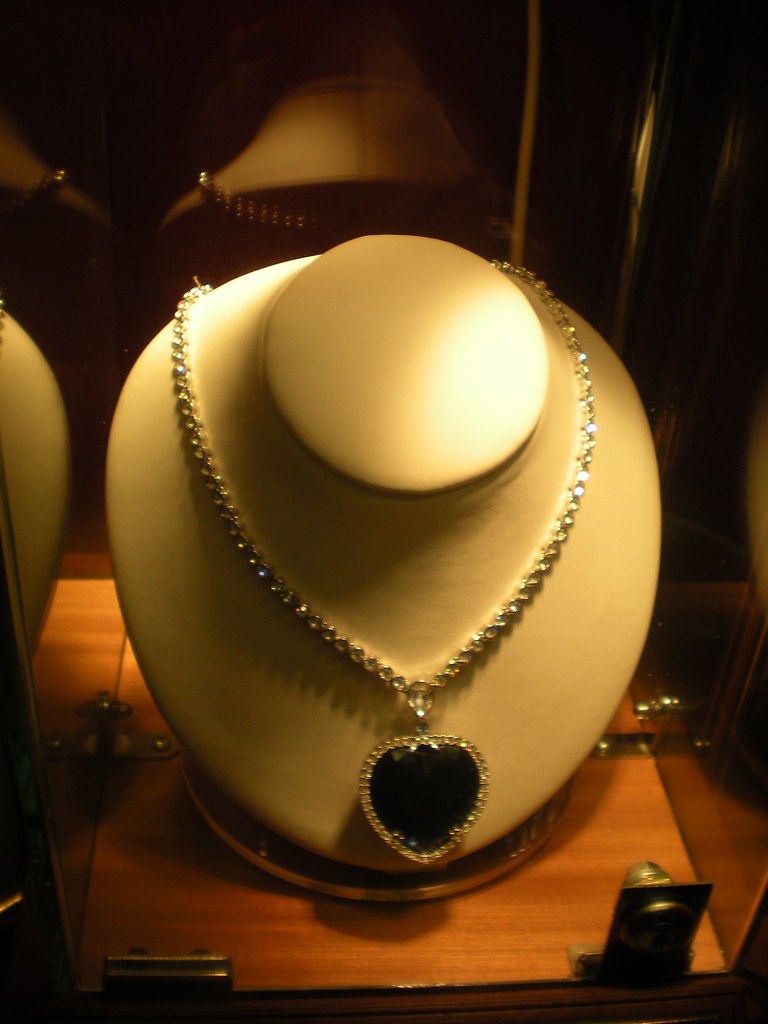Americanization
The Power of Hollywood
The film props below must look familiar. Who does not immediately recognize the entry way to Jurassic Park (1993), the park in which dinosaurs were once again brought to life with the purpose of entertaining the public, but it proved to be an utter disaster? One might remember the suspense one felt when watching one of the many “T-rex scenes,” in which Dr. Grant and the children had to be as quiet as possible to prevent getting caught. Or perhaps one knows this park bench , on which Forrest Gump (1994) sits in his signature white suit telling strangers about the extraordinary things he has experienced? Asking oneself at the scene where Forrest meets former US president John F. Kennedy: “How did they manage to make this work?”, with ‘they’ referring to the film’s production team. Finally, one must recognize the blue heart-shaped diamond necklace from Titanic (1997); instantly reminding one of the scene where Jack draws Rose, wearing only the necklace, on the night of the sinking. Or maybe one thinks of the moment when the now 101 year-old Rose drops the diamond back into the ocean again; frustratingly asking oneself while watching: “Now why would she do that?”
American Films and Dutch pop culture

Although these films all have premiered over twenty years ago, many people can still identify these objects in a heartbeat. When these films came out in the 1990s, they collectively managed to draw over a million Dutch people to the cinemas. And as of today, audiences still like to watch them; not only in the cinema, but also on television and on other streaming services. But it goes beyond that. Dutch teen magazines continue to write articles on the chemistry between ‘Jack and Rose’; and it is still possible to buy Forrest Gump or Jurassic Park merchandise. These three films thus have managed to leave a mark on Dutch popular culture, even though they are not considered to be the best films ever made in terms of stylistic choices and narrative structure. It makes one wonder: Does the cultural power these American films hold, and thus their popular status, mean all of us are completely Americanized? And if so, should one be wary of this American influence on Dutch popular culture?
Images © “The Heart of the Ocean diamond necklace, as worn by Kate Winslet in Titanic” by Ben Sutherland. https://www.flickr.com/photos/60179301@N00/2546671772
Adapted and Adjusted
Of course, the answer to this is up to debate, and it is a question that has been explored in the field of American Studies for years. It is safe to say scholars do not agree on this topic. However, over the last twenty years, the general conclusion has been that even though Europeans significantly consume American popular culture, this does not mean Europeans do so passively (Gienow-Hecht, p. 467-468). Rather, American influences on Dutch popular culture are adapted and adjusted. Dutch populations thus incorporate the films into the Dutch cultural canon (Kooijman, p. 17-19).
Sources
Gienow-Hecht, Jessica. “Shame on US? Academics, Cultural Transfer, and the Cold War – A Critical Review.” Diplomatic History, Vol. 24, No. 3, 2000, pp. 465-495.
Kooijman, Jaap. “Americans We Never Were: Teaching American Popular Culture in the Netherlands.” The Journal of American Culture, Vol. 34, No. 1, 2011, pp. 16-25.

Images © “The Forrest Gump bench at Paramount Studios” by Castles, Capes & Clones. https://www.flickr.com/photos/66478195@N00/5498354647.
What does Americanization mean?
Apart from the scholarly debate on Americanization, there is of course one very important factor: The consumer of popular culture. Scholars may tend to look at a certain society as a whole. But naturally, consumers can completely single-handedly decide which parts of popular culture to consume. So even if these films are extremely popular, this does not mean that one individually Americanizes. It is probably much harder to establish this on an individual level. In addition, a consumer devours popular culture at their leisure, and might not be as concerned with the concept of Americanization. Still, it cannot be denied Americanization is everywhere. Is this a disastrous or concerning development? Or should Americanization be cherished? That is up to the spectator to decide.

Images © “Welcome…to Jurassic Park!” by BrianMoranHDR. https://www.flickr.com/photos/40788961@N05/5950619761.